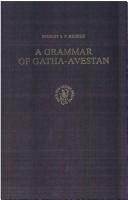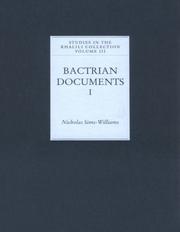| Listing 1 - 10 of 10 |
Sort by
|
Book
ISBN: 9783447103008 3447103000 Year: 2014 Volume: 12 Publisher: Wiesbaden : Harrassowitz Verlag,
Abstract | Keywords | Export | Availability | Bookmark
 Loading...
Loading...Choose an application
- Reference Manager
- EndNote
- RefWorks (Direct export to RefWorks)
Bactrian, the only Iranian language written in the Greek alphabet, was spoken in ancient Bactria in northern Afghanistan. It is an intermediary Middle Iranian language, possessing the characters of both Eastern and Western Iranian groups, and thus playing a very important role in the dialectology of Iranian Languages. Saloumeh Gholami’s study deals with various relatively unknown phonological, morphological and syntactical features of Bactrian and includes the following topics: historical phonology of Bactrian; the syntactical position of different kinds of nouns and their relationship in a sentence; the different types of pronouns and their syntactical properties; the function and syntactical position of prepositions and postpositions; adverbs and their formation; proximate and remote deixis adverbs as well as their different syntactic positions; various kinds of conjunctions and their functions; selected aspects of the verb; word order in clauses with transitive or intransitive verbs, and an investigation of double object constructions; as well as the different types of compounds.
Bactrian language --- Grammar --- Grammar. --- Bactrian language - Grammar
Book
ISBN: 9783700181842 3700181841 Year: 2018 Volume: 505 83 Publisher: Wien : Verlag der Österreichischen Akademie der Wissenschaften,
Abstract | Keywords | Export | Availability | Bookmark
 Loading...
Loading...Choose an application
- Reference Manager
- EndNote
- RefWorks (Direct export to RefWorks)
More than 150 documents in Bactrian, the chief administrative language of pre-Islamic Afghanistan, have come to light during the last twenty-five years. These documents include letters, legal contracts, economic documents and a few Buddhist texts; many of them bear dates in the so-called “Bactrian era”, which is also known from a few inscriptions, such as the Tochi valley inscriptions in Pakistan, but whose starting-point is controversial. The Bactrian documents have the potential to transform our knowledge of the history of the region during the 4th to 8th centuries CE, a period for which we have few contemporary records, but before they can be fully exploited as historical sources it is necessary to establish their relative and absolute chronology. The present volume aims to fulfil this need. In Part 1 we consider the dated documents, discussing the nature of the Bactrian calendar and the epoch of the Bactrian era, and concluding with a conspectus in which all the attested dates are converted to Julian dates on the basis of the facts and arguments presented. In Part 2 we turn to the equally important undated documents, systematically weighing up all types of evidence, whether historical, prosopographical, palaeographical, linguistic or orthographic, which may have a bearing on their dating. Part 3 provides a handy check-list of our conclusions, while the Appendices provide additional and supporting material including editions of the Tochi valley inscriptions and of a Pahlavi letter which was purchased together with the Bactrian documents.This book will be required reading for scholars and students of the pre-Islamic and early Islamic history of Iran, Afghanistan and Central Asia. It will also be a useful resource for those interested in the languages, religions and numismatics of the region.
Bactrian language --- Texts --- Dating --- Afghanistan --- History --- Bactrian language - Texts --- Bactrian language - Texts - Dating --- Afghanistan - History - Sources
Book
ISSN: 09304304 ISBN: 9783110253085 3110253089 Year: 2011 Volume: 13 Publisher: Berlin de Gruyter
Abstract | Keywords | Export | Availability | Bookmark
 Loading...
Loading...Choose an application
- Reference Manager
- EndNote
- RefWorks (Direct export to RefWorks)
Avestan language --- Syntax --- Avesta language --- Bactrian language (Old Bactrian) --- Old Bactrian language --- Zend language --- Iranian languages --- Avestique (langue) -- syntaxe
Book
ISBN: 3920153359 9783920153353 Year: 1974 Volume: 7 Publisher: Wiesbaden Reichert
Abstract | Keywords | Export | Availability | Bookmark
 Loading...
Loading...Choose an application
- Reference Manager
- EndNote
- RefWorks (Direct export to RefWorks)
Avestan language --- Avestique (Langue) --- Lexicology --- Lexicologie --- -Avesta language --- Bactrian language (Old Bactrian) --- Old Bactrian language --- Zend language --- Iranian languages --- Lexicology. --- -Lexicology --- Avesta language --- Avestan language - Lexicology

ISBN: 9004083324 Year: 1988 Publisher: Leiden Brill
Abstract | Keywords | Export | Availability | Bookmark
 Loading...
Loading...Choose an application
- Reference Manager
- EndNote
- RefWorks (Direct export to RefWorks)
Avestan language --- Avestique (Langue) --- Morphology --- Phonology --- Morphologie --- Phonologie --- -Avestan language --- -Avesta language --- Bactrian language (Old Bactrian) --- Old Bactrian language --- Zend language --- Iranian languages --- Morphology. --- Phonology. --- -Morphology --- Avesta language
Book
ISBN: 1283400227 9786613400222 3110253097 9783110253092 3110253089 9783110253085 9783110253085 311218937X Year: 2011 Publisher: Berlin Boston
Abstract | Keywords | Export | Availability | Bookmark
 Loading...
Loading...Choose an application
- Reference Manager
- EndNote
- RefWorks (Direct export to RefWorks)
This is the first modern comprehensive account of the syntax of Old Avestan, the earliest known form of Iranian language, attested in the Gathas of Zarathushtra and the Liturgy in Seven Chapters. It is based on the most up-to-date understanding of the texts, while following traditional principles of grammatical analysis. There are also substantial sections on word order, stylistics, and figures of speech. Translations are provided for almost all passages quoted. The work will be welcomed by Iranianists as well as by historical linguists with wider Indo-European interests.
Avestan language --- Avesta language --- Bactrian language (Old Bactrian) --- Old Bactrian language --- Zend language --- Iranian languages --- Syntax. --- Avestan language - Syntax --- Indo-European Languages. --- Iranian Language. --- Old Avestan. --- Zarathushtra.
Book
ISBN: 3882262028 Year: 1984 Publisher: Wiesbaden Reichert
Abstract | Keywords | Export | Availability | Bookmark
 Loading...
Loading...Choose an application
- Reference Manager
- EndNote
- RefWorks (Direct export to RefWorks)
Avestan language --- Avestique (Langue) --- Verb --- Verbes --- -Avesta language --- Bactrian language (Old Bactrian) --- Old Bactrian language --- Zend language --- Iranian languages --- -Verb --- Avesta language --- Avestisch. --- Verb. --- aveszta nyelv. --- nyelvészet. --- Verbe. --- Avestique (langue) --- Langues iraniennes --- Grammaire

ISBN: 9781874780915 1874780900 0197275028 9781874780908 9781874780922 9780197275023 1874780919 Year: 2000 Volume: 3 3, 6 Publisher: Oxford : Nour Foundation in association with Azimuth Editions and Oxford University Press,
Abstract | Keywords | Export | Availability | Bookmark
 Loading...
Loading...Choose an application
- Reference Manager
- EndNote
- RefWorks (Direct export to RefWorks)
Texte en anglais et en bactrien
Avesta language --- Avestaans (Taal) --- Avestan language --- Avestique (Langue) --- Bactrian language (Old Bactrian) --- Iran--Languages --- Old Bactrian language --- Zend language --- Law --- Afghanistan --- History --- Social conditions --- Economic conditions --- Avestan language. --- Bactrian language --- Sources --- Law - Afghanistan --- Afghanistan - History - Sources --- Afghanistan - Social conditions - Sources --- Afghanistan - Economic conditions - Sources
Book
ISBN: 9783700139638 3700139632 Year: 2007 Volume: Nr. 41 Publisher: Wien Österreichische Akademie der Wissenschaften
Abstract | Keywords | Export | Availability | Bookmark
 Loading...
Loading...Choose an application
- Reference Manager
- EndNote
- RefWorks (Direct export to RefWorks)
Indo-Iranian philology. --- Avestan language --- Indo-Iranian languages --- Names, Personal --- Indo-Iranian literature --- Philologie indo-iranienne --- History. --- Names. --- Epithets. --- Religious aspects. --- History and criticism. --- Indo-Iranian philology --- Names (in religion, folklore, etc.) --- Indo-Aryan philology --- South Asian literature --- Indo-European languages --- Avesta language --- Bactrian language (Old Bactrian) --- Old Bactrian language --- Zend language --- Iranian languages --- History --- Epithets --- Names --- History and criticism --- Religious aspects --- Avestan language - History. --- Indo-Iranian languages - Names. --- Indo-Iranian languages - Epithets. --- Names, Personal - Religious aspects. --- Indo-Iranian literature - History and criticism.
Book
ISBN: 3700137370 9783700137375 Year: 2006 Volume: 745. Bd. 3 Publisher: Wien Österreichische Akademie der Wissenschaften
Abstract | Keywords | Export | Availability | Bookmark
 Loading...
Loading...Choose an application
- Reference Manager
- EndNote
- RefWorks (Direct export to RefWorks)
Names, Personal --- Vedic language --- Old Persian language --- Noms de personnes --- Noms de personnes vieux-perses --- Védique (Langue) --- Vieux perse (Langue) --- Sanskrit. --- Old Persian. --- Etymology --- Names. --- Sanscrits --- Etymologie --- Noms --- Vedas. --- Avesta. --- Avestan language --- Vedic --- Avestan --- Names --- Avesta --- Criticism, interpretation, etc. --- Avestan. --- Vedic. --- Védique (Langue) --- Old Indic language --- Vedic Sanskrit language --- Indo-Aryan languages --- Sanskrit language --- Anthroponomy --- Baby names --- Christian names --- Family names --- Forenames --- Names of families --- Names of persons --- Personal names --- Surnames --- Onomastics --- Avesta language --- Bactrian language (Old Bactrian) --- Old Bactrian language --- Zend language --- Iranian languages --- Etymology&delete& --- R̥igveda --- R̥gveda --- Rg Weda --- R̥gveda-saṃhitā --- R̥g-Veda-saṃhitā --- Ригведасамхита --- Rigvedasamkhita --- Rig Veda --- Āśvalāyanaśākhīyā R̥gvedasaṃhitā --- Abistā --- Zend-Avesta --- Avistā --- Avesto --- Vedic personal names --- Avestan personal names --- Names, Personal - Vedic --- Names, Personal - Avestan --- Vedic language - Etymology - Names --- Avestan language - Etymology - Names --- Acqui 2006 --- Veda. R̥gveda-saṃhitā --- Noms de personnes védiques --- Védique (langue) --- Noms de personnes avestiques --- Avestique (langue) --- Femmes --- Littérature sanskrite --- Onomastique --- Critique, interprétation, etc. --- Étymologie --- Dans la littérature --- Thèmes, motifs --- Inde --- Iran
| Listing 1 - 10 of 10 |
Sort by
|

 Search
Search Feedback
Feedback About UniCat
About UniCat  Help
Help News
News